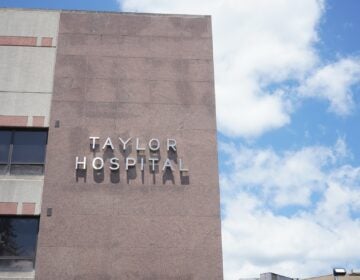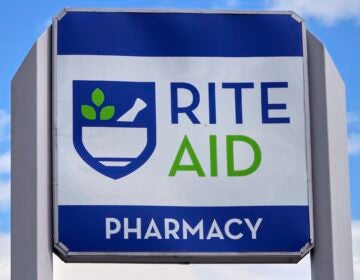Philly Whole Foods criticized for lack of transparency after worker got COVID-19
For companies, there’s a balancing act between communicating accurate, vetted information and keeping workers in the loop about the evolving health risks of the job.
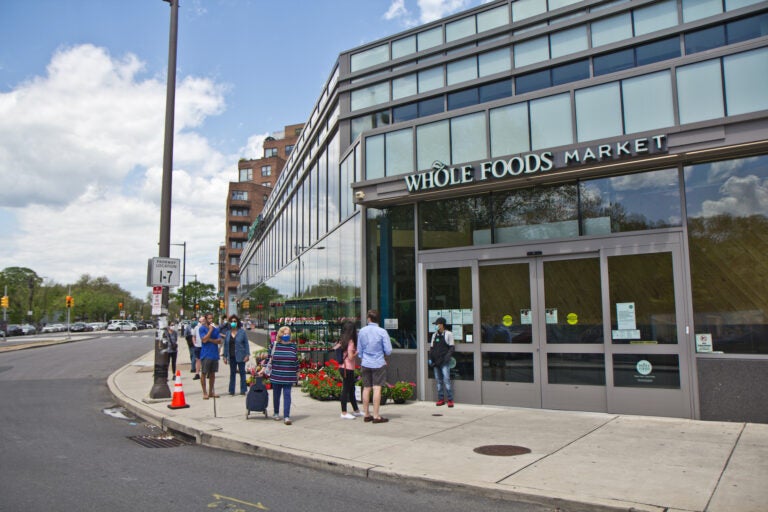
An employee directs people into the store at the Whole Foods grocery in Philadelphia’s Fairmount neighborhood. (Kimberly Paynter/WHYY)
Are you on the front lines of the coronavirus? Help us report on the pandemic.
The rumors had been swirling among employees at the Whole Foods Market in Fairmount for days.
“Someone mentioned they heard someone might be sick,” said one worker. A few days later, store leadership started telling people “one-by-one,” they continued.
“I found out from a text from another front-end team member,” said another employee.
After days of nervous gossip, the company sent a message through its emergency notification system on April 30: a worker had tested positive for COVID-19. One employee said they were told by management separately that the person had gone home sick a week prior.
Whole Foods confirmed the case to Keystone Crossroads, but declined to share specifics out of privacy concerns.
Whether due to testing delays, privacy, or the slow adoption of new means of communication, days can pass between when a sick Whole Foods employee begins staying home, and when their colleagues learn of a case of COVID-19 in the workplace.
For companies, there’s a balancing act between communicating accurate, vetted information and keeping workers in the loop about the evolving health risks of the job.
For workers, in the absence of clear communication, fearful questions can arise: If I had been working closely with someone now known to have COVID-19, could I have done something better to protect myself and my family if I had been warned sooner?
“I feel lied to,” said one Fairmount Whole Foods employee, who asked to remain anonymous out of concerns for job safety. Keystone Crossroads spoke with three current employees of the store to confirm and cross-check this account. All described a lag in notification, along with uneven safety precautions that make them feel uneasy.
“We all share lockers and computers and bathrooms,” continued the same employee, who said it was “scary” to have had to wait “to know that we may have unknowingly come into contact with the virus.”
Part of that delay may have been due to the time it takes to get a test result, another worker said.
Still, “[the company] knew on Tuesday [April 28] and they didn’t tell everyone,” said the employee, who claimed to learn of the case when a colleague was quarantined due to exposure days before the emergency notification went out.
Whole Foods disputes that it took days to inform staff of the positive case. “As soon as the Team Member in question shared a positive COVID-19 diagnosis with the store, their fellow Team Members were notified,” wrote spokesperson Spencer Taylor in an email. The company defended its pandemic-era action plan for confirmed cases, which includes contact tracing and formal notification of employees via in-store team meetings and an auto-call/text system.
Grocery stores and their workers have been trying, and sometimes struggling, to balance safety with high demand during the coronavirus pandemic. Whole Foods put in place crowd control measures, installed plexiglass barriers, provided face masks to employees and instituted stricter cleaning protocols, among other safety enhancements. These new procedures have largely become standard industry-wide, although adoption and policies can vary between chains and even store to store.
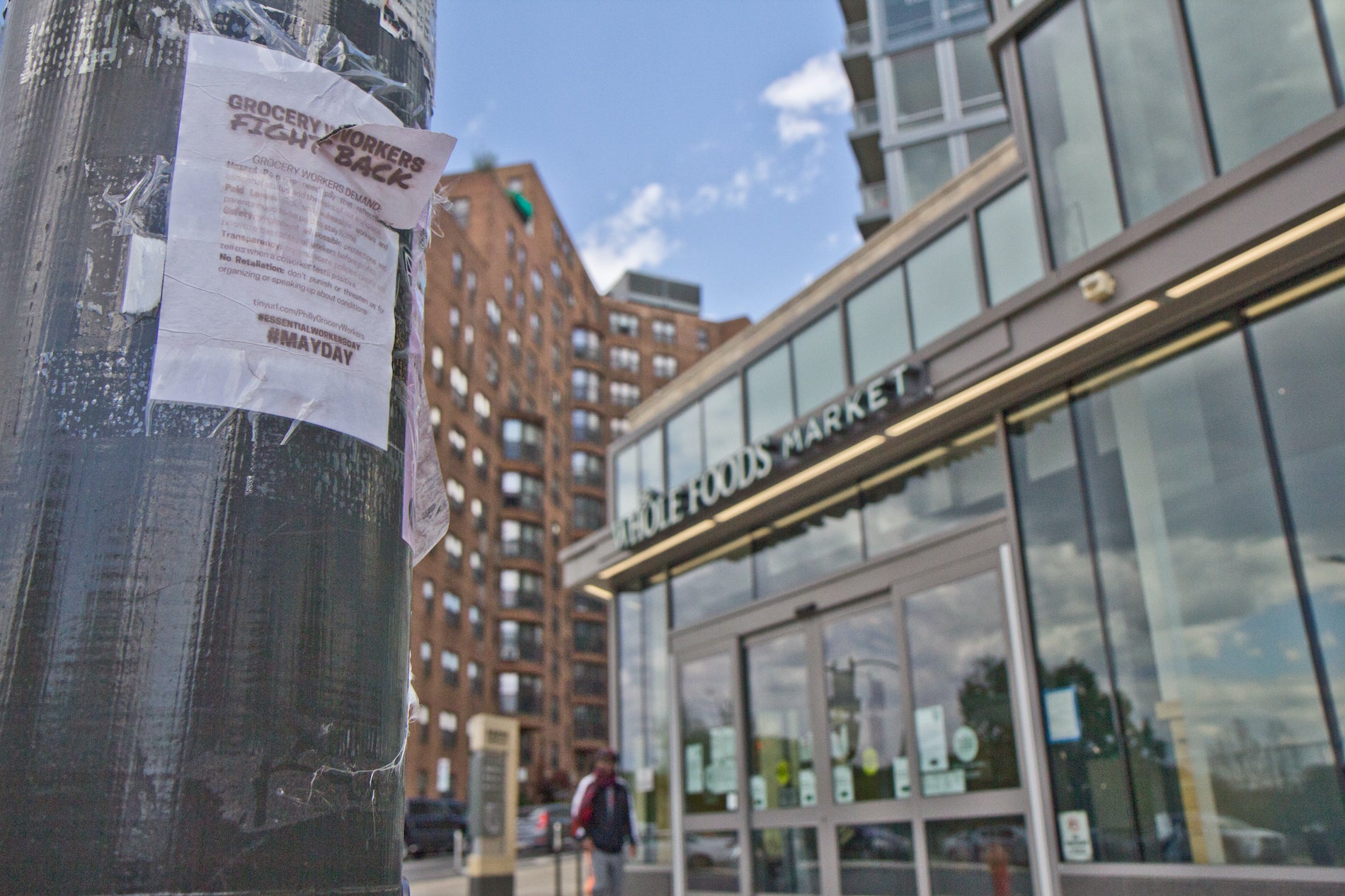
“The safety of our Team Members and customers is our top priority and we are diligently following all guidance from local health and food safety authorities,” said Taylor. “We’ve been working closely with our store Team Members, and are supporting the diagnosed Team Member, who is in quarantine.”
A second text notification announcing another case went out Monday night, which management also confirmed. Workers are also receiving an extra $2 per hour in hazard pay and can take unpaid leave without triggering absence penalties through May 17.
‘More information’
Employees interviewed said they do not know which of their colleagues has COVID-19, but that some workers who had contact are quarantining. Whole Foods says they offer such employees up to two weeks of paid sick time.
Unlike some other stores, such as ShopRite and Fresh Grocer, Whole Foods does not notify the public when an employee tests positive, or share when they last worked.
There are legal reasons to be discreet in naming individuals, which would violate the Americans with Disabilities Act.
“Employers should inform employees that possible exposure has occurred in the workplace without disclosing any identifying information about the individual who tested positive,” says guidance posted by the Society for Human Resource Management.
Naming individuals is distinct from sharing general information about a possible exposure, however.
“The argument for letting people know as quickly as possible is because if they’re having to wait an extended period of time — before they know that they’ve been around someone who has tested positive — they actually could have been infectious during that time period themselves,” said Krys Johnson, assistant professor of instruction in the department of epidemiology and biostatistics at Temple University. That could put their friends and family members at risk, “especially considering there are so many asymptomatic cases.”
But Johnson points out that not even state governments agree on a best practice. Pennsylvania is more conservative in releasing any information about the whereabouts of people who tested positive to prevent them from being stigmatized, a policy she said is “a holdover” from dealing with outbreaks of sexually transmitted diseases.
“Considering the highly contagious nature of this disease, it’s more important to err on the side of giving people more information to be more proactive about their health,” Johnson said.
In the words of another Whole Foods employee at the Fairmount store, not knowing was “not cool.”
“I wish that they would have sent out something sooner,” they said, “if the person’s symptoms were severe enough to have them do a deep clean of the store.”
Whole Foods denied that deep cleaning only occurs based on employee symptoms or diagnosis.
“Out of an abundance of caution, the store has had multiple professional deep cleanings in addition to our rigorous cleaning and sanitation measures, not specifically because of a Team Member showing symptoms,” wrote Taylor.
Wonky scanners and other safety issues
As stores roll out new safety measures to try to protect staff and customers, some say efforts such as mandatory body temperature checks are flawed and may end up backfiring.
“The temperature guns don’t work,” said one Whole Foods employee at the Fairmount location, echoing workers at several stores.
“It’s completely unreliable,” said a veteran employee at the company’s Devon location who was scanned at 91 degrees Fahrenheit. “I pretty much have hypothermia at that point.” The Chester County store has had four confirmed cases of COVID-19, according to the employee.
The infrared temperature sensors have become widely adopted by governments and businesses attempting to limit the spread of the virus. But the devices have been criticized by medical officials as ineffective, especially when wielded by colleagues who may not take the measurements consistently or precisely.
Whole Foods employees describe inconsistent results and patchy use of the tools. There may not be anyone at the door to scan first thing in the morning.
“It just seems very poorly organized and orchestrated… I don’t feel valued,” said the Devon location employee.
Sales at Whole Foods rose by 8% during the first quarter, which coincided with the beginning of the pandemic and parent company Amazon saw revenues jump 26%, according to a report from Vox. However, the grocer says much of those profits will disappear as they change workflows and invest in new safety equipment.
—
This article has been updated to include additional responses from Whole Foods that came after initial publication. It was also corrected to state that Whole Foods workers were first officially told of a positive COVID-19 case at the Fairmount location on April 30, not April 29.
WHYY is your source for fact-based, in-depth journalism and information. As a nonprofit organization, we rely on financial support from readers like you. Please give today.



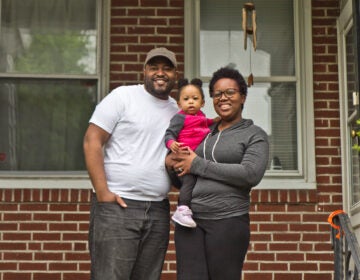
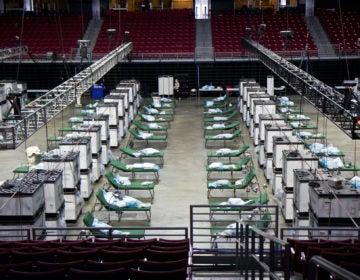
![CoronavirusPandemic_1024x512[1]](https://whyy.org/wp-content/uploads/2020/03/CoronavirusPandemic_1024x5121-300x150.jpg)
